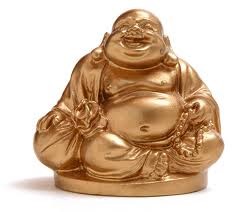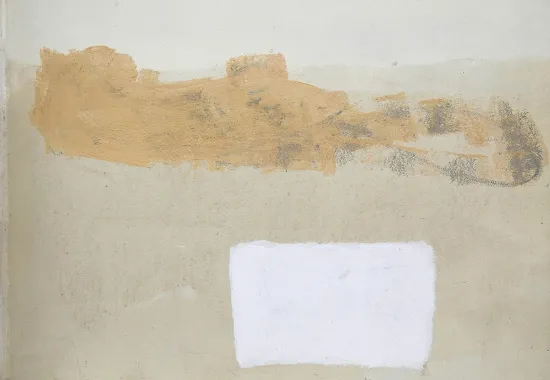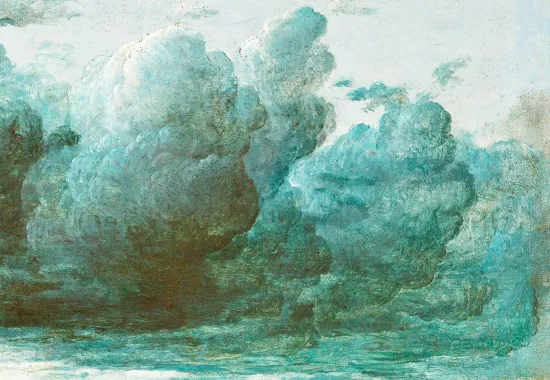"The Gift Tower: Ethnicity, Race, Class, Consumerism, Advertising/Marketing, and the Interrogation of Whiteness"

Gift Tower
When I read Siddhartha in Mrs. Stevens’ World Lit class,
the problem I had was reconciling the somber, skinny,
beneath-the-lotus-tree Buddha with the smiling,
fat-bellied, shiny golden Buddha beside the register
at Mei-Ling Shanghai, Metuchen’s only ethnic restaurant.
It’s like when I open the Harry & David Christmas catalogue
with its red-blushed orbs made to look like they spent
the night in the dewy air, when in fact they’ve been sprayed
with ethylene gas, droplets meticulously arranged
by a food stylist. When I see that sheen on the skin
of a fruit, I think about the skin of the man or woman
who picked it, down there in Medford, Oregon. His skin
is not green but brown, glistening with sweat or rain
or something in-between, and I don’t have to tell you
how much he’s getting paid to pack the Moose Munch
Popcorn for the Crater Lake Gift Basket Classic,
which, maybe he’s thrilled, cuz now he can purchase
a flat-screen, an Xbox One, or at least buy now, pay
later, thanks to Royal Riviera Pears, wrapped
in golden cellophane, emanating incongruous joy.
When I sat down to write this poem, all I had was the opening question: what was up with these two distinct depictions of the Buddha, and how could they be reconciled? The smiling, fat Buddha who sat beside the register in the Chinese restaurant of my hometown, not unlike the thousands of Chinese restaurants that blanket the U.S, and the emaciated Buddha I’d read about in Siddhartha. When did the austere, starving-to-death-under-a-lotus-tree Buddha morph into a jolly fella, a big-bellied beardless Santa?
“Gift Tower” never gets around to directly answering this question: that the laughing Buddha isn’t a Buddha at all but a monk, that his huge stomach represents wealth, but not the material kind of wealth. Instead, my poem focuses on material wealth—Xboxes and flat-screens—hopefully not in a disparaging or condescending way, but to acknowledge that most humans desire gadgets and games, have always desired diversions … unless a deity, a desire to “live deliberatively” (choose to be frugal), or “limited means” serve to squelch their purchasing power.
So, here’s the equation I set up in this poem, the reason the Buddha/monk are present: the golden, smiling monk is to the starving, enlightened Buddha what the sweaty and brown-skinned migrant farmworker is to the fake-dewy, chemically ripened, gold-wrapped fruit. To say it another way, the smiling vs. starving Buddha set up a comparison in the poem: the lie that is the so-called chubby Buddha is compared to the lies consumers receive when they open their gleaming arrays of packaged fruit—who picked and packed them, what ripened them, who earned what wage to load the fruit onto the truck, all stricken from the record.
Honestly, I made an assumption in this poem. I didn’t do research on what percentage of fruit pickers, down in southern Oregon or in our nation as a whole, have brown skin. But I would entertain that Mexicans are picking that fruit, just as they are doing the majority of the slaughtering of our chickens, pigs and steer—work involving blood and chlorine and God knows what else—jobs most whites won’t touch.
The joy of the gold-wrapped fruit, like the joy of the starving Buddha, is incongruous—out of place and inharmonious; it cannot be reconciled, sort of like a conundrum, the sound of one hand clapping, to borrow a famous koan from Zen Buddhism. It is something to be contemplated and reflected upon, this golden-wrapped pear in disguise, the real work of those who tend its branches, its roots completely out of the picture. It’s the Lie white people tell themselves over and over, isn’t it? The joy of the pear, the joy of the monk/Buddha at the cash register, are for the wealthy and privileged and, in most cases, the higher- class white consumer.
And yet, there it is: a perfect fruit wrapped up in a perfect lie, the myth that our food arrives at our tables in a pristine state, devoid of the sweat of thousands (millions?) of low-paid workers toiling at shit jobs to feed themselves and their families.
Perhaps I make too much of a smiling monk, of a pear wrapped in gold. More likely, I haven't made nearly enough of a ruckus about it. David Mura, in his article “Ferguson, Whiteness as Default, & the Teaching of Creative Writing” (The Writer’s Chronicle, October/November 2016), envisions a scenario where white creative writers
"interrogate the ways their own identity and experiences are intrinsically deeply structured by race, how their Whiteness … [is] not [a] negligible matter … but constitute[s] a huge unexamined question, an ontological and political blind spot."
In this poem, in future poems, and as a literary citizen, it my aim to take up Mura's cause.
Recommended
Mercy
Eclipsing
Psychic Numbing






